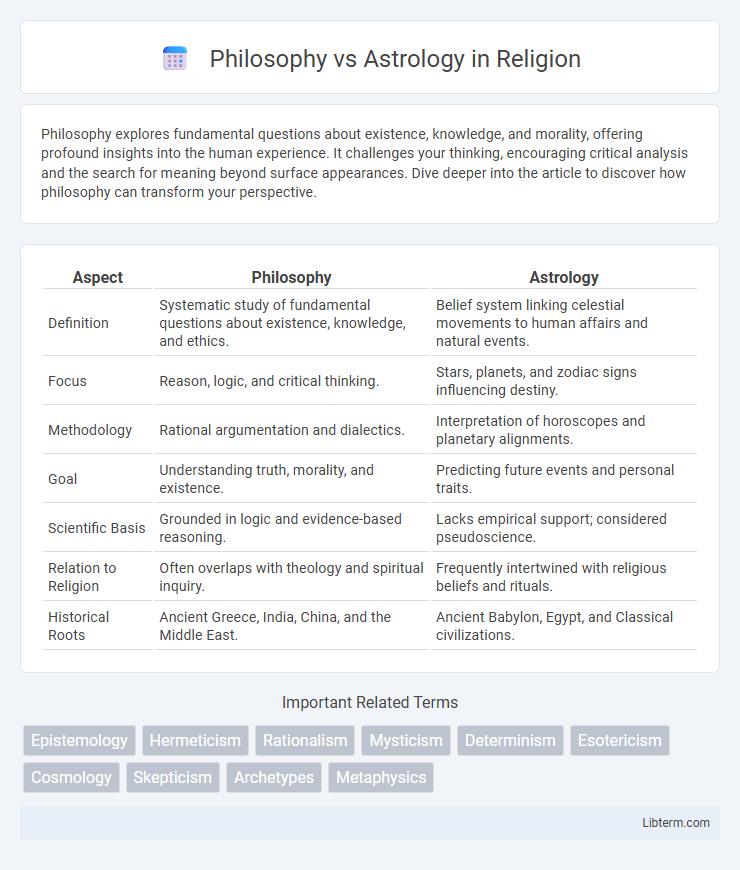Philosophy explores fundamental questions about existence, knowledge, and morality, offering profound insights into the human experience. It challenges your thinking, encouraging critical analysis and the search for meaning beyond surface appearances. Dive deeper into the article to discover how philosophy can transform your perspective.
Table of Comparison
| Aspect | Philosophy | Astrology |
|---|---|---|
| Definition | Systematic study of fundamental questions about existence, knowledge, and ethics. | Belief system linking celestial movements to human affairs and natural events. |
| Focus | Reason, logic, and critical thinking. | Stars, planets, and zodiac signs influencing destiny. |
| Methodology | Rational argumentation and dialectics. | Interpretation of horoscopes and planetary alignments. |
| Goal | Understanding truth, morality, and existence. | Predicting future events and personal traits. |
| Scientific Basis | Grounded in logic and evidence-based reasoning. | Lacks empirical support; considered pseudoscience. |
| Relation to Religion | Often overlaps with theology and spiritual inquiry. | Frequently intertwined with religious beliefs and rituals. |
| Historical Roots | Ancient Greece, India, China, and the Middle East. | Ancient Babylon, Egypt, and Classical civilizations. |
Defining Philosophy and Astrology
Philosophy is the systematic study of fundamental questions about existence, knowledge, ethics, and reason, relying on critical thinking and logical analysis. Astrology is a belief system that interprets the positions and movements of celestial bodies to predict human behavior and earthly events. While philosophy seeks rational understanding through evidence and argument, astrology depends on symbolic meanings and horoscopic interpretations.
Historical Origins and Development
Philosophy emerged in ancient Greece around the 6th century BCE with thinkers like Thales and Socrates focusing on reason, ethics, and the nature of existence, establishing a foundation for critical inquiry and scientific thought. Astrology originated in Mesopotamia during the 2nd millennium BCE, rooted in Babylonian celestial observations that linked planetary movements to human affairs and natural events. While philosophy prioritized rational argument and empirical observation, astrology developed as a symbolic system integrating mythology and astronomy for divination purposes.
Core Beliefs and Principles
Philosophy centers on rational inquiry, critical thinking, and the search for truth through logic, ethics, and metaphysics, emphasizing human reason as the primary tool for understanding existence and knowledge. Astrology, in contrast, is based on the belief that celestial bodies influence human behavior and events, relying on zodiac signs and planetary positions to interpret personality and predict future occurrences. While philosophy demands empirical evidence and coherent argumentation, astrology often depends on symbolic interpretation and traditions without scientific validation.
Methods of Inquiry and Validation
Philosophy employs rigorous logical reasoning and critical analysis as primary methods of inquiry, relying on dialectical argumentation and empirical evidence to validate claims. Astrology, however, uses symbolic interpretation and observational correlations to make predictions, often lacking reproducible experimental validation within scientific standards. The epistemological framework of philosophy prioritizes falsifiability and internal consistency, contrasting with astrology's reliance on tradition and anecdotal evidence.
The Role of Logic and Reason
Philosophy relies on rigorous logic and reason to analyze fundamental questions about existence, knowledge, and ethics, using critical thinking and structured arguments to reach conclusions. In contrast, astrology depends on symbolic interpretations of celestial movements without empirical evidence, often appealing to intuition and belief rather than rational proof. The role of logic in philosophy ensures systematic inquiry and coherent understanding, whereas astrology's reliance on tradition and anecdotal correlations lacks the rational framework central to scientific and philosophical disciplines.
Influence on Society and Culture
Philosophy shapes society by providing critical frameworks for ethics, knowledge, and governance, deeply influencing cultural values and intellectual movements. Astrology impacts culture through symbolic interpretations of celestial events, affecting art, literature, and personal belief systems. The divergent methodologies highlight philosophy's rational inquiry versus astrology's mystical tradition, resulting in varied societal roles and cultural expressions.
Criticism and Controversies
Philosophy often criticizes astrology for lacking empirical evidence and scientific rigor, classifying it as a pseudoscience rather than a legitimate field of knowledge. Skeptics highlight astrology's reliance on symbolic interpretations and untestable predictions, contrasting sharply with philosophy's emphasis on logic, reason, and critical inquiry. The controversies surrounding astrology center on its persistence despite these methodological flaws and its influence on decision-making without substantiated proof.
Modern Perspectives and Relevance
Modern perspectives distinguish philosophy as a rigorous discipline grounded in critical thinking, logic, and empirical inquiry focused on understanding existence, ethics, and knowledge. Astrology, by contrast, is regarded primarily as a pseudo-science or cultural practice that interprets celestial movements to predict human behavior and events, lacking empirical validation. Despite skepticism, astrology maintains relevance in contemporary culture through its psychological appeal and influence in popular media, while philosophy continues to shape academic discourse and ethical frameworks in modern society.
Key Figures and Influencers
Philosophy features key figures such as Socrates, Plato, and Aristotle who shaped Western thought through critical inquiry and metaphysics. Astrology's influential figures include Claudius Ptolemy, whose work "Tetrabiblos" systematized astrological knowledge, and Johannes Kepler, who combined astronomy with astrological principles. The contrast lies in philosophy's foundation on reason and logic versus astrology's reliance on celestial interpretation for human affairs.
The Intersection and Divergence
Philosophy and astrology intersect in their shared pursuit of understanding human existence and the cosmos, with philosophy relying on critical reasoning and metaphysical inquiry, while astrology emphasizes celestial influence and symbolic interpretation. Divergence arises as philosophy demands empirical evidence and logical coherence, whereas astrology operates within a framework of faith and tradition, often lacking scientific validation. This fundamental contrast highlights philosophy's emphasis on universal truths through rational debate versus astrology's personalized, predictive insights based on star patterns.
Philosophy Infographic

 libterm.com
libterm.com